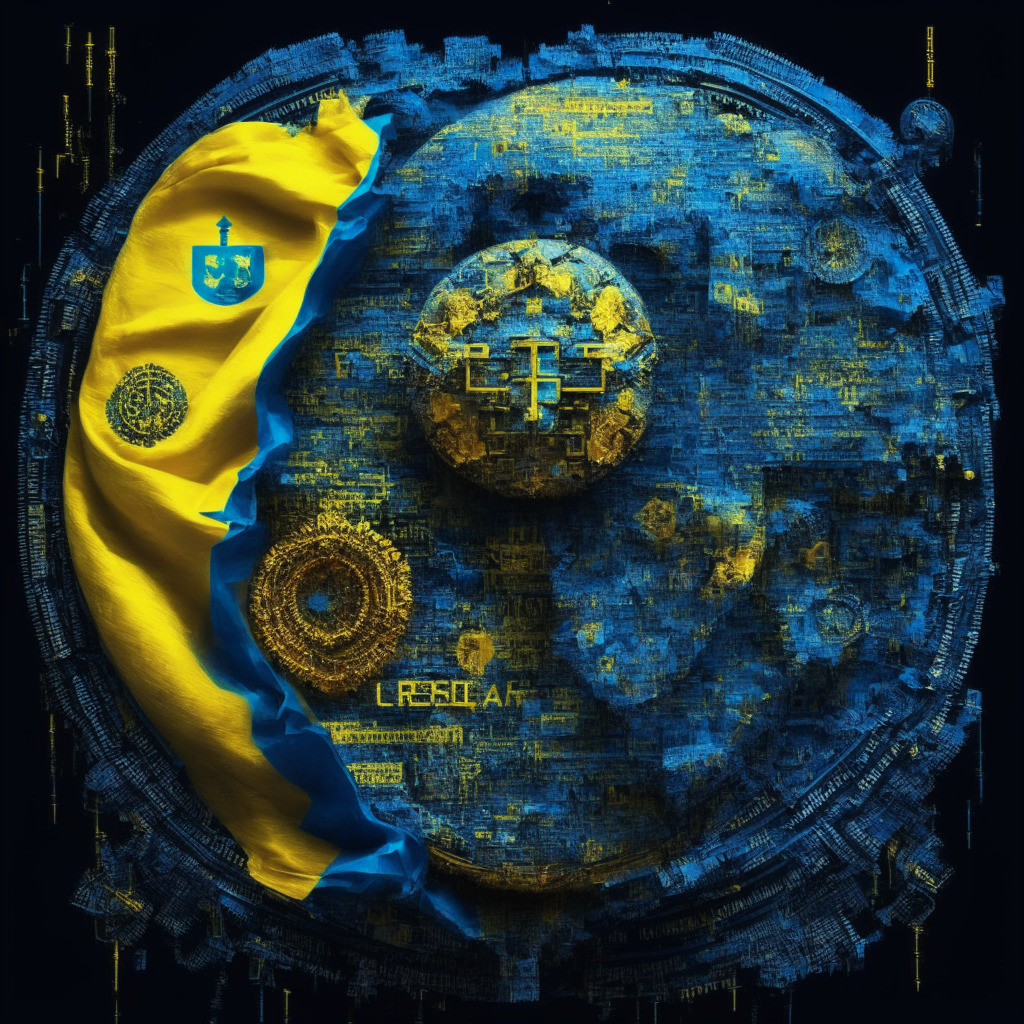“Ukraine’s Ministry of Digital Transformation has announced a roadmap for AI regulatory progress, aiming to prepare businesses for future requirements and ensure ethical AI usage. Meanwhile, major crypto players are adjusting to new financial promotion regulations from the UK’s Financial Conduct Authority, aiming to foster clean and transparent crypto promotions, despite potential challenges for smaller players.”
Search Results for: Ukraine
Crypto Crime Investigation Training Surge in Ukraine: A Move Towards Global Crypto Compliance?
Ukrainian law enforcement officers are being trained by European Union officials in crypto crime investigation, highlighting the Ukrainian government’s dedication to aligning its crypto policies with those of Brussels. The sessions focus on tracking crypto transactions and identifying their participants, given the potential misuse of these transactions for illegal activities. This aligns with the BEB’s focus on combating financial crime in the crypto industry.
Blockchain Meets Soccer: Game4Ukraine’s Metaverse Journey and Potential Pitfalls
“Ukrainian President Volodymyr Zelenskyy announces Game4Ukraine, a charity soccer event witnessed worldwide and extended to a metaverse watch party. The event also involves selling customizable jersey non-fungible tokens (NFTs) to raise funds. However, concerns emerge about the accessibility and complexity of cryptotechnology.”
Navigating MiCA: Ukraine’s Struggle with new EU Crypto Regulation Measures
As Ukraine nears EU membership, it faces a critical shift with the impending Markets in Crypto-Assets Regulation (MiCA). The law’s stringent requirements for crypto service providers might reduce the attraction of Ukraine’s jurisdiction. Moreover, compliance challenges could discourage new entrants, potential legal risks, and steep issuance costs, affecting crypto exchange services. The regulation also overlooks certain crypto assets, leaving a potential legislative gap. However, feasible adaptation of MiCA could help Ukraine influence European crypto policy upon getting full EU membership.
Regulating the Crypto Frontier: Stifling Innovation or Safeguarding Investors in Ukraine?
The National Bank of Ukraine’s increased control over local crypto firms has been met with concern. The bank’s demand for full financial transparency raises questions about the potential stifling of this burgeoning industry. Yet, despite the harsh regulatory landscape, the Ukrainian market holds untapped potential, suggesting that this regulatory turbulence could drive Ukrainian crypto stakeholders towards international success.
Digital Assets in War: Analysing Ukraine’s Crypto Boost amid Russian Conflict
Ukraine has benefited from the decentralized nature of cryptocurrencies amid the Eastern European conflict, with $225 million worth flowing into the country for essentials such as weaponry and medical supplies. Despite slowing donations, financial backing persisted. Notably, most contributions geared towards humanitarian initiatives than military operations. USDT emerged as the primary donation currency, followed by Ether, Bitcoin, and others. Contrastingly, Russia’s crypto fundraising has been lesser and subtle. Technology and economic strategy in crisis times aren’t free from potential manipulations and concealed transactions.
Potential Russian Military Coup: How It Could Impact Crypto Market Amid Ukraine Crisis
Ongoing Ukraine war and potential Russian military coup may impact global markets, including crypto. With Russia’s significant role in oil and gas, a civil war could benefit Bitcoin and altcoin prices as perceived safer assets amid uncertainty.
Illegal Crypto Mining Farm Exposed in Ukraine: A Cautionary Tale for Blockchain Adoption
Ukraine’s State Bureau of Investigation (SBI) has exposed an illicit crypto mining farm operating within a state-owned enterprise, Forests of Ukraine, mining over $108,000 and consuming around $41,000 worth of government resources. This crackdown aligns with Ukraine’s efforts to combat “crypto corruption” and emphasizes the importance of implementing effective regulations for the safe and legitimate growth of the crypto industry.
Ukraine’s 18% Crypto Tax Proposal: Balancing Regulation and Market Appeal
Ukrainian regulators propose an 18% tax on cryptocurrency gains starting 2024, with plans to introduce a draft law and grant regulatory powers to the National Commission for Securities and Stock Market and the central bank. The proposed tax has sparked mixed reactions in Ukraine’s crypto community, with concerns about discouraging investors and potential user exodus.
Aligning Ukraine’s Crypto Regulations with EU Standards: Balancing Consumer Protection, Financial Stability, and Market Growth
The National Bank of Ukraine (NBU) is working towards aligning the country’s crypto regulations with European standards, particularly the EU’s Markets in Crypto-Assets (MiCA) legislation. The NBU emphasizes maintaining financial stability, consumer protection, and transparency, while considering Ukraine’s unique legal and financial systems.
Unmasking Crypto Corruption: Ukraine’s Challenge to Maintain a Thriving Market
Ukraine’s National Anti-corruption Bureau (NABU) is probing the crypto sector to unmask money launderers in collaboration with the United States Embassy and the US State Department. Aiming to scrutinize cryptoassets, the largest training program in NABU’s history will educate participants on combating cryptocurrency-related crimes and ensure that crypto is no longer a means to hide corruption.
Sanctions Against Binance US Investigator: Impact on Crypto Amid Russia-Ukraine Crisis
Russia expands its sanction list, including Binance U.S. Head of Investigation, BJ Kang, among 500 entities facing travel and financial restrictions. Binance is under scrutiny for reportedly generating high traffic from Russia, raising concerns over compliance with U.S. sanctions amid the ongoing Russia-Ukraine crisis.
IRS and Ukraine Tackle Crypto Fraud: Balancing Innovation and Market Integrity
The IRS partners with the Ukrainian government to tackle cryptocurrency fraud globally, focusing on Russian individuals suspected of evading sanctions. They will provide training on tracing blockchain transactions for Ukrainian officials using a tool developed by Chainalysis. This increased scrutiny raises concerns for the crypto industry, but Brian Armstrong, Coinbase CEO, argues that blockchain’s transparency deters illicit activities.
Hacker Heist: Stealing Russian Crypto for Ukraine’s Cause or An Inside Job? Pros and Cons Revealed
An unnamed Bitcoin user reportedly hacked hundreds of wallets purportedly controlled by Russian security services, […]
Geopolitical Tensions: Unpredictable Influence on Financial Assets and the Crypto Market
“The escalating tensions between Israel and Hamas are affecting global financial markets, causing a decline in emerging stocks and cryptocurrencies, and a surprising uptick in traditional safe havens like oil and precious metals. Amid this turmoil, global economies are grappling with high oil prices and inflationary pressure, while the long-term effects are yet to be seen.”
Bitcoin’s Stability Amid Geopolitical Instability: An Unusual Crypto Market Behavior
Bitcoin’s price remains steady at $28,000 despite global geopolitical instability, unlike gold, oil, or the U.S. dollar which have experienced turbulence. Anticipation mounts over future volatility as Bitcoin’s reaction to unfolding geopolitical crisis and potential economic fluctuations remains uncertain.
Unraveling Former FTX CEO’s Trial: A Spotlight on Industry Protocol and Responsibilities
The upcoming trial of former FTX CEO, Sam Bankman-Fried, plans to spotlight on his conduct and expectations by bringing former FTX customers, investors, and staff members for testimonies. These testimonies are aimed to scrutinize Bankman-Fried’s actions and statements about asset management, thereby shaping the interpretation of his behaviour. The results of this trial hold significance for blockchain industry regulations.
Government Shutdown Dodged: Possible Fallout for Cryptocurrency Regulation
“The future of cryptocurrency regulation was at risk with the potential for a government shutdown. This stalemate could have hindered several key crypto-focused bills, including the Financial Innovation and Technology for the 21st Century Act, the Blockchain Regulatory Certainty Act, among others, shaping crypto’s future.”
Unveiling the Paradox: Blockchain Potential Amid Rampant Security Concerns
“In a world advancing in blockchain technology, security remains a significant concern, as demonstrated by the FTX exploit which led to a $17.1M loss. This exploit caused swift Ethereum transfers, affecting crypto market sensibility and user confidence significantly.”
DOJ vs. Former FTX Executive: A Crypto Legal Showdown and its Potential Impact
“The upcoming trial of former FTX executive, Sam Bankman-Fried, aims to unravel FTX’s approach in managing customer assets, a key factor for the case’s outcome. Meanwhile, Ethereum co-founder, Vitalik Buterin, expresses concerns about a possible monopoly by decentralized autonomous organizations (DAOs), highlighting potential vulnerabilities in the blockchain ecosystem.”
Burning Man and DAOs: A Hybrid Model for Decentralized Governance and Broader Adoption
“Decentralized Autonomous Organizations (DAOs) could gain broader acceptance and adoption by marrying central planning with decentralized governance. This hybrid model could allow DAOs to gain recognition outside the crypto sphere, potentially fostering broader appeal and breaking away from their crypto rigidity.”
Unraveling Crypto Adoption: Growth Momentum in Lower Middle Income Countries Vs. Homogenized Landscape
The 2023 Chainalysis Global Crypto Adoption Index reveals a rise in cryptocurrency adoption in Central and Southern Asia, with countries like India, Vietnam, and the Philippines capturing significant positions. Lower Middle Income countries, which house 40% of the world’s population, show resilience in adoption trends, and are poised to shape the future of global cryptocurrency adoption.
India’s Paradoxical Supremacy in Global Crypto Index: High-Tax-Averse or Accelerator?
“India has topped the Global Crypto Adoption Index 2023, despite strict tax regulations on crypto trades. The tax schemes paradoxically stimulating a shift in transaction methods, thus driving the adoption of digital currencies, particularly in struggling economies like India, Nigeria, and Vietnam.”
Crypto Mining Boom in Russia: A Double-Edged Sword with an Environmental Impact
An illicit cryptocurrency miner in Russia’s Far East allegedly stole $225,000 in electricity, causing major harm to a local grid. Such unauthorized access for mining is harmful to power networks, leading to heavy penalties. This incident underscores the increasing issue in the crypto mining space of unauthorized electricity consumption by illicit miners, posing threats to energy grids and overall security.
Navigating Regulatory Waves: Analyzing the Impact of Recent Staff Exits at Binance
Binance, a reputable cryptocurrency exchange, bids farewell to high-ranking executives amidst talks of a potential Russian exit. This occurs amid global sanctions on Russia, and may be primarily ignited by regulatory hurdles. The implications of this upheaval extend to Binance’s operations in Russia, amounting to a significant 6.3% of total visits to Binance.com. This transition underscores the need for careful navigation of regulatory landscapes for successful crypto exchanges.
Global Sting Operation Exposes Cryptocurrency Scam: A Milestone in International Cyber Crime Cooperation
A multinational sting operation uncovers a company’s malicious software facilitating the theft of millions from crypto investors. Successful collaboration among international authorities was essential in arresting this operation, underlining the need for global coordination to combat cybercrime. This demonstrates the importance of vigilance and responsiveness in securing the future of cryptocurrency.
Decentralization Versus Sanctioned Russian Banks: The P2P Dilemma in Crypto Exchanges
Crypto exchanges including OKX and Bybit have delisted Russian banks Tinkoff and Sberbank, due to Western sanctions following the Ukraine invasion. Despite this, the decentralized nature of P2P transactions makes complete enforcement challenging. The delistings highlight the growing reliance on cryptocurrencies amid Russia’s economic instability due to these sanctions.
Binance Controversy: Balancing Digital Freedom and International Sanctions Compliance
Binance, a popular cryptocurrency exchange, circumvented sanctions on two Russian banks by renaming them for local payment options. Critics argue this move may increase regulatory control over crypto markets. Meanwhile, supporters believe it demonstrates crypto’s independence from traditional financial systems and governmental interference. Binance’s actions have raised questions about crypto exchanges’ responsibility to respect international regulations.
Surprise in Crypto Territory: Bitcoin and Ethereum Less Volatile than Oil
“The new study by Kaiko reveals surprising reduction in volatility of Bitcoin and Ethereum, now lower than that of oil. Current market trends suggest a maturing cryptocurrency market, with global developments and increased adoption reducing volatility. Regulatory scrutiny and potential approval of a spot ETF could further influence this dynamic.”
Crypto Charitable Campaigns: A Beacon of Hope Amidst Global Market Volatility
‘Cointelegraph’ has launched a crypto-based charitable campaign called ‘Children of Heroes’ to support Ukrainian children affected by the ongoing conflict. Accepted donations include Bitcoin, Ether, Dogecoin, and Litecoin, aimed at long-term support for over 5,000 beneficiaries. The project highlights the potential of cryptocurrency as a force for good in society.
Surprising Shift in Market Dynamics: Oil Now More Volatile than Bitcoin and Ethereum
“Cryptocurrency markets are seeing a surprising shift with Bitcoin and Ethereum becoming less volatile than oil. A factor of this decreased volatility is attributed to geopolitical tensions, economic echoes, and maturation of Bitcoin as market adoption increases.”
Untangling WhiteBIT’s Extravagant Promises: The Involved Risks and Rewards in Crypto Lending Platforms
The WhiteBIT platform, connected with crypto figure Justin Sun, promises an alarming 24.8% APY for Tether deposits, tripling the average USD rate. Made noteworthy due to Sun’s history of promoting risky stablecoins, WhiteBIT’s extremely high returns warrant intensive scrutiny from informed investors.






























